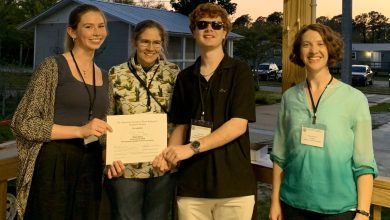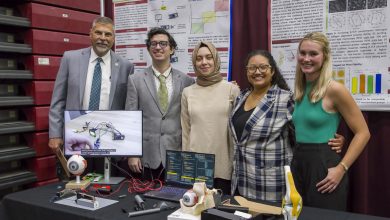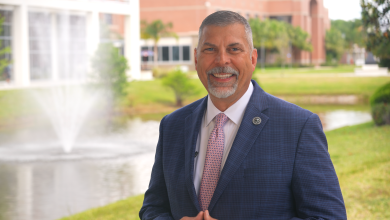Scientific ZOOlaboration
Partnerships with the Brevard Zoo connect students with hands-on science
What do you get when you have a top-notch institution of higher education and research and a zoo that is a world-recognized leader in conservation within miles of each other?
A harmonious relationship that results in hundreds of students, scientists, community members and, not to mention, animals all benefitting from these minds colliding.
Florida Tech and the Brevard Zoo have developed a long-standing relationship, but over the past several years, efforts have been stepped up to strengthen the bond.
Michael Grace, senior associate dean of Florida Tech’s College of Science, is spearheading the charge.
“We’ve decided it’s time to do more. It only makes sense,” Grace said. “We believe we can capitalize on the unique opportunities that both institutions have to offer and better our community.”
Student Collaboration

More and more Florida Tech students are getting involved in different projects and research opportunities the zoo offers, while the zoo is benefiting from the university’s eager students and brilliant minds. Grace wants to make sure Florida Tech students are aware of the phenomenal, hands-on opportunities that are available so close to the university and that the community recognizes the fantastic work that is being done.
“We’ve always had a great working relationship, and we do wonderful things together,” Grace said. “Michelle Smurl (Brevard Zoo’s director of animal programs) and I started pushing forward on collaborative research a few years ago. We’re excited about the progress we’ve made so far, and now we want to ramp up the number and the depth of projects our two institutions do together.”
Keith Winsten, executive director for the zoo, concurs. He is eager to see expanded student collaborations, such as zoo visits integrated into relevant curricula.
“We are a perfect fit for ethology or ecology classes,” he said.
Amy Fenwick Reaume ’08 passed the Brevard Zoo every day while she was a college student at Florida Tech back in the mid 2000s. While earning a bachelor’s degree in biological sciences/aquaculture track, Reaume was completely unaware of the long-standing relationship her university had with the zoo and the opportunities available to students.
In fact, she had only been to the zoo one time—to take photos for a photography class at Merritt Island High.
“I didn’t realize the amazing work that many zoos are doing in conservation and educating the public about environmental issues,” Reaume said.
Through a series of well-timed events, she began working at the zoo in January 2009, one month after graduating, as the lead aquarist for the Indian River Lagoon exhibit that was set to open in February 2009. Her current role at the zoo is conservation coordinator.
“I am so happy that fate brought me to Brevard Zoo because I truly feel like I have found my niche sharing a passion for wildlife conservation with our guests and the community,” she said. “Brevard Zoo is a perfect partner to share the great research that Florida Tech is doing in a way that the general public can understand and how that research impacts all of us. Likewise, Florida Tech is a perfect partner for Brevard Zoo to aid in research that benefits our animal ambassadors, as well as their native habitats, and in situ conservation programs. All of this offers amazing opportunities for students to get involved right in their own backyard! These experiences are so important and can play a huge role in shaping the direction of a student’s career.”
It gives her great joy when her job allows her to work with Florida Tech students and help expose them to all the great opportunities the zoo offers.
“You can see the excitement in their eyes,” Reaume said. “It’s the experience of a lifetime for students.”
Now she’s one of two zoo employees, along with Florida Tech’s Grace, who helps facilitate one of the longest running collaborations between the two entities: Science Café.
Community Collaboration

Science Café is an informal gathering where major science issues are discussed with the help of an expert in the field. They are held the second Wednesday of each month at Tradewinds Restaurant at Duran Golf Club.
The events are free and the format is not a lecture, but rather a forum for exploring new frontiers in science and technology. Attendees have a chance to learn and mingle with accomplished scientists and others who share the same interests.
Topics have ranged from concussions in sports to ecology and conservation in the Galapagos Islands to the emergence of harmful algal blooms as health threats to marine wildlife.
Among other outreach activities, Florida Tech students help run some of the most popular events at the zoo.
Boo at the Zoo is a crowd-favorite Halloween-themed event held every October at the zoo. Students from Florida Tech’s chapter of the Tri Beta Biological Honor Society dress up and entertain children along the haunted trails.
Grace and his students also work closely with the zoo to help put on the successful Cold Blooded Weekend, held over the Labor Day holiday. The special event celebrates cold-blooded creatures such as reptiles, amphibians and fish.
“We set up in the lodge and provide a large educational display,” Grace said. “One year we featured snakes, while another year we educated the public about invasive species. It’s great for our students because they are the ones managing the exhibits and discussing the issues.”
Research Collaboration

Florida Tech students and faculty members also are involved in many behind-the-scenes research projects.
Zoo veterinarian Trevor Zachariah collaborates with Florida Tech on several projects, including examining the blood chemistry of snakes and analyzing the infrared imaging systems of boas, pythons and pit vipers.
“This is the best IR sensor on the planet, and we are working to understand how it operates in order to better understand these animals, to understand their threats as invasive species and to develop new and better artificial infrared imaging systems for industrial, scientific, biomedical and defense applications,” Grace said. “Together with Dr. Zachariah, my students and I are literally watching the snake’s brain at work in real time in order to understand this unique ability of these snakes to see the world through its heat signatures.”
Research isn’t limited to the Brevard Zoo campus. Students often accompany zoo employees off site to make observations and perform experiments.
They have worked together in the Indian River Lagoon learning about the Florida east coast diamondback terrapin.
“This turtle was hunted nearly to extinction because it was considered a delicacy,” Grace said. “It lives right along the coastline of the eastern United States. There are seven subspecies, and the one in east central Florida is the most poorly known. From our observations, it appears to be relatively rare. The population dynamics we just don’t understand. In a very strong collaboration, we’ve developed a team to determine where they are, how many, where they nest, how they nest. There are strong education and public outreach components to this work.”
Other projects students get to work on include investigating the behavioral biology of the endangered Perdidio Key beach mouse, an important part of Florida’s coastal ecosystem.

Winsten sees promise in expanding this type of collaboration, where graduate students use zoo animal populations as non-invasive study subjects.
“Perdido Key beach mice are tremendously under-studied,” he said. “It would be great for both institutions to contribute to the field through some published studies.”
“Any time a student can get hands-on training, they have a better sense of what they are learning,” Grace said. “The practical experience teaches them what life will be like in the real world. They may find job opportunities directly from these activities.”
Grace said Brevard Zoo is the perfect place for students to learn and gain practical experience and provides excellent opportunities for biologists, psychologists and educators to collect scientific data.
“Brevard Zoo is a community built, self-funded zoo, and it’s young so it has a different mode of operation than larger, older zoos,” he said. “The Brevard Zoo is truly, deeply interested in engaging the community.”
Both parties are looking forward to continuing their relationship.
“Our hope is that we will identify more and more opportunities for us to work together and take advantage of each other’s unique resources,” Winsten said. “Brevard Zoo is active in applied conservation and conservation education but relies on external scientists to inform our work. Florida Tech is home to a diverse and accomplished faculty doing research in many areas relevant to the zoo. Their presence in the community is critical to keeping local stakeholders focused on science-based decisions and provides a steady stream of well-educated conservationists and educators who come work on our staff. We, in turn, bring wildlife and conservation issues from around the world into Florida Tech’s backyard. Together we can do so much.”
—Michelle Spitzer




